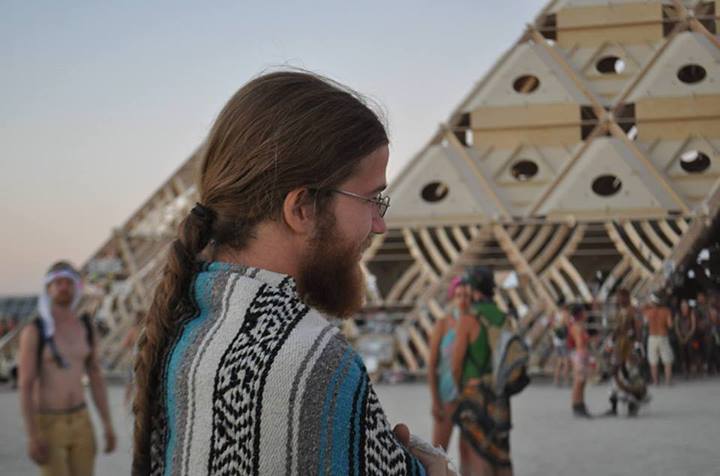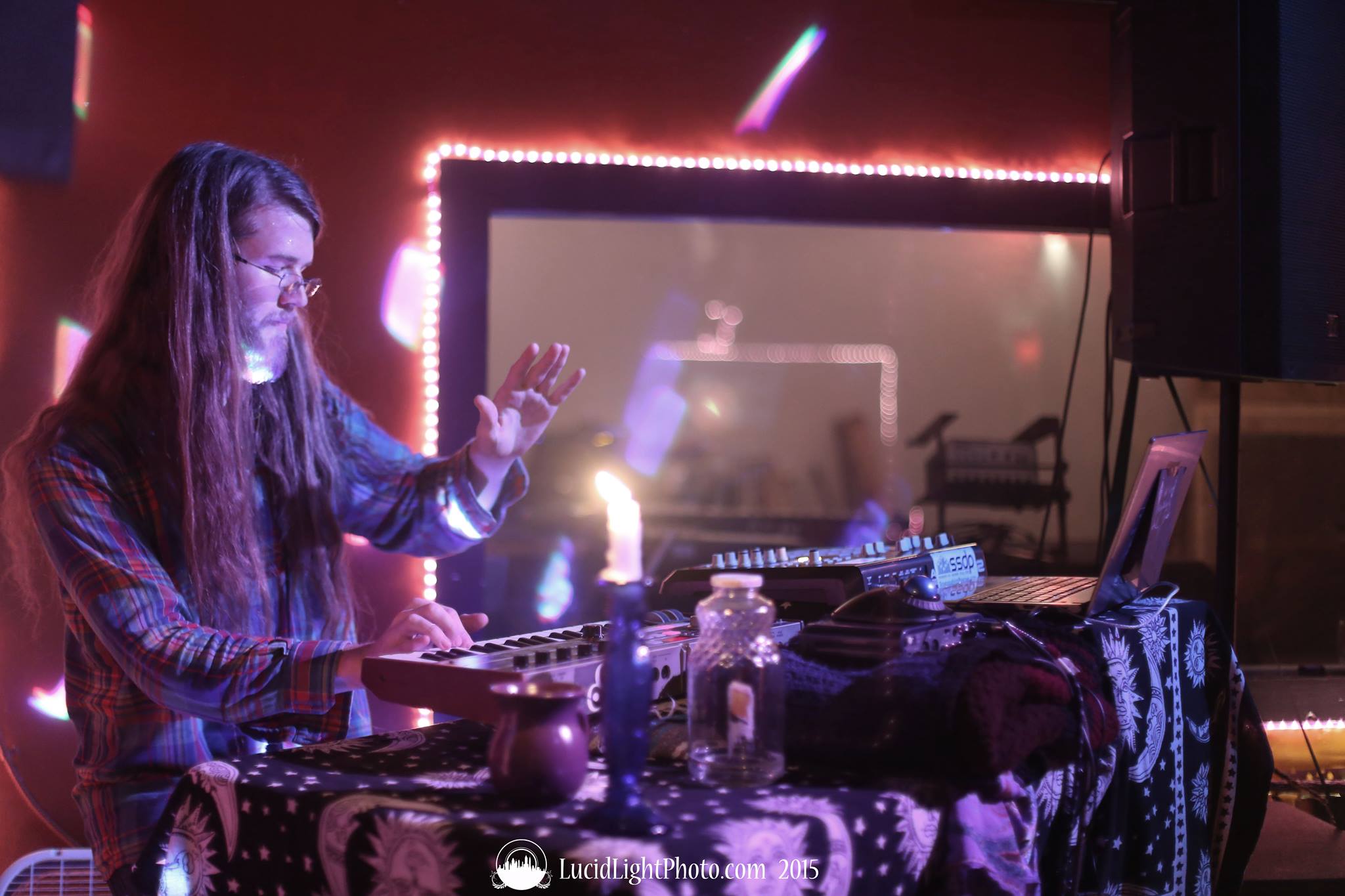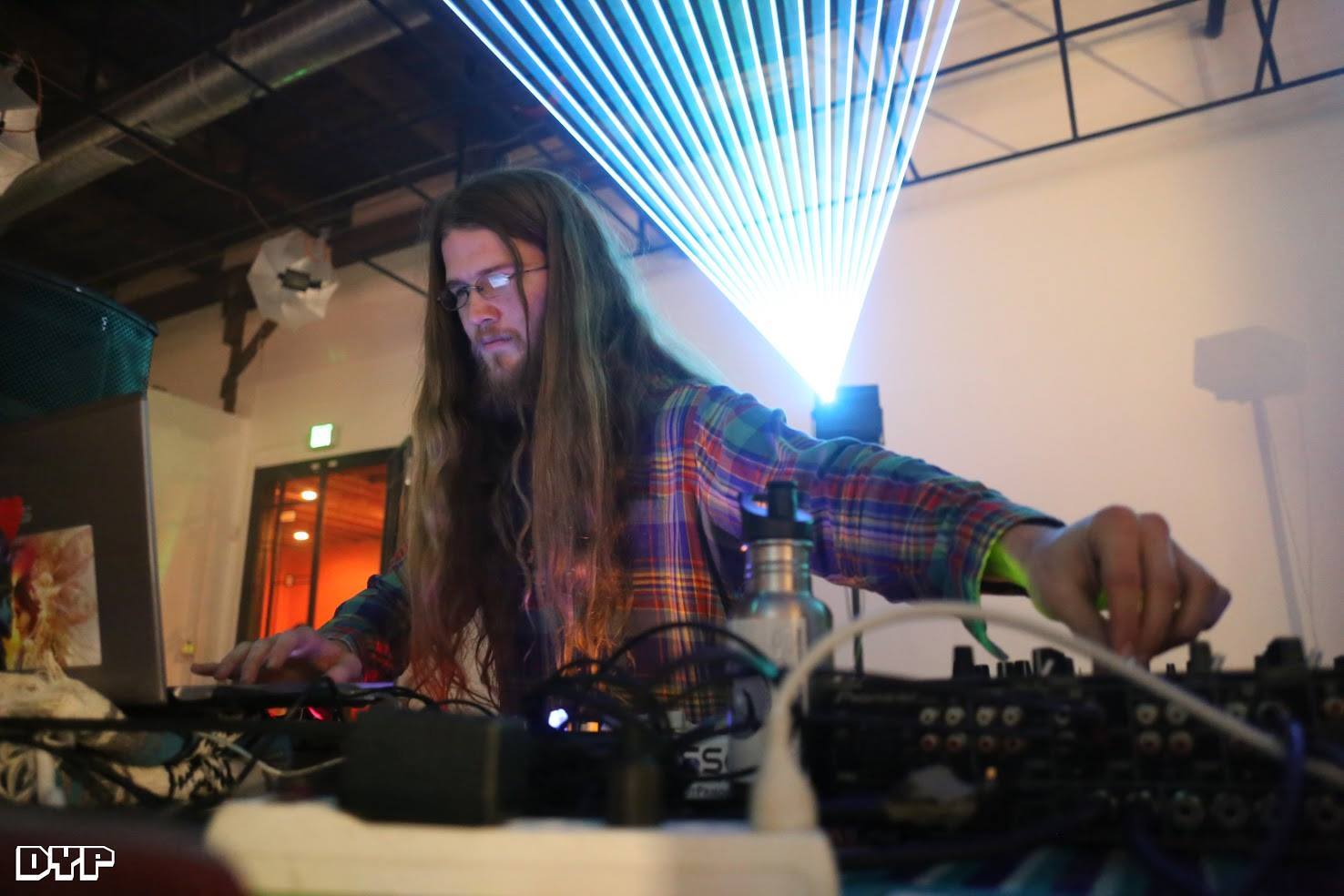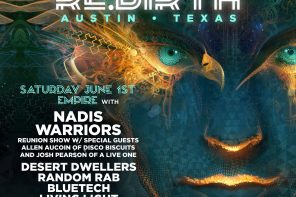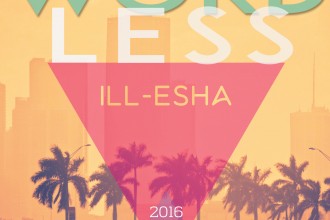Erothyme (Bobby West) is the result of Al Hofmann himself, genetically modifying the DNA of Stevie Wonder and Poseidon, God of the Sea. It’s been almost five years since our first Erothyme sighting and he’s done nothing but improve and impress since. With heavy influences from supernovas such as Squarepusher and Aphex Twin, Erothyme’s more melodic approach makes for a more accessible IDM. His sound immediately feels like someone glitched you into a bass church and fed you a couple drops of the real stuff. One hand in the air as if to ward off the evil spirits, Bobby’s other hand tickles the keys of the classic microKorg keyboard. If you’re the sunrise type, chances are you’ll be hearing Erothyme trickle through the treetops at this summers festivals, all throughout the land!
TRACK LIST
00:00 – Dusk Precipice (feat. Kyrstyn Pixton)
05:45 – Crossing Staars (feat. Emma Staarbird)
10:22 – Moonlight through Bare Branches (feat. Madelion Moondrop)
14:27 – Full Woodshed Beats
20:20 – Concordant Grains
23:51 – I You We
28:19 – Gratuitous Grace III (As the Bird Flies)
32:16 – Finer Things
36:34 – Transients
42:05 – Thousand Hands of God (feat. Entheo)
47:57 – Something Has Changed
[LiS] Where did audio production start for you?
[Erothyme] When I was twelve, one of my friends got his hands on some audio editing software. I installed it on my family’s computer, and soon I was making the most alien noises I could come up with using limited understanding and limited resources that I had. I was fueled by a steady diet of experimental electronic music, which I could barely make sense of at first – but I think it’s cryptic nature, and the way the groove was able to shine through anyway, was part of what initially made it so charming. That was the beginning of a long and beautiful journey into digital sound for me which has involved so many twists and turns, so many processes of discovery. Over time I found I was ignoring a lot of distractions (television, video games, academia, etc.) and devoting to the music increasingly more completely. You could say I started early and took the scenic route. In some ways, in spite of the vast amount of information that has already crystallized throughout this process, it sometimes still feels like it’s only the beginning.
Where did the name Erothyme come from?
Erothymia (ero-thigh-mia) means a state of mind characterized by creative energy, the love of life, and the tendency toward wholeness. Erothyme means something which induces erothymia. I nabbed the idea from Aldous Huxley, who once came up with the word phanerothyme, meaning something which induces a state of mind in which the eros, or the fundamental creative drive, is visible. Since I work mostly with audio, I removed the root that had to do with vision. Simpler and more general was probably a good idea with such an unusual word. It’s been difficult for some to latch onto, but thankfully it’s also unique enough to be difficult to mistake once it clicks.
You released your most recent album in August. What is its premise, a golden thread, or overall “vibe” you’re emitting to the listener?
Empathic Circuitry was a big project for me – 17 tracks, spanning a wide energy spectrum. Some tunes on the delicate, mellow, simple side, others more along the lines of tightly-woven fiery light speed future funk. Wide emotional range, and very emotional indeed. Some of the tracks were started two years ago, and some were new. I spent months trying to make my final decisions on the exact track list (selecting from dozens of tracks, most of which are still unreleased), but certain tunes seemed to be mandatory inclusions the whole time, and ultimately those tunes made the necessary overall angle pretty clear to me.
There are a number of noteworthy underlying themes going on. There are a lot more tracks with vocals and lyrics than was usual for me before, both my own vocoder work and also recordings of others singing. There was much greater use of personal recordings of myself and my friends playing acoustic instruments on this record than any of my previous releases (pianos, guitars, clarinet, various percussion…). Previously almost all of my released work was composed by writing everything piece by piece in a digital audio workstation, but almost every track on this album included some amount of improvised keyboard playing as part of the creative process (some recordings more edited than others). I included some remixes of others’ work which I hadn’t done on my own albums before, and I included more collaborations than ever before as well as two reworks of an older track of mine (this was a first), all while still managing to squeeze in just as much original content as I ever have, if not more.
Empathic Circuitry was something of a follow-up to my previous album (Muses & Grace), which was a landmark to me in its own right. These tunes tell love stories, and they needed to be as feeling-toned as possible. As the title reflects, this album has a lot to do with the heart shining through the machine, as well as the circular nature that these tales of bliss and heartbreak tend to have.
What are a few production rituals that keep you healthy and productive?
These things go hand in hand, because most of the time more healthy equals more productive.
Taking the time to stretch, taking walks and/or go running is totally worth it and will ultimately save you time by increasing your energy levels and reducing the strain of sitting half-relaxed in front of a machine clicking things with your right index finger all day. Wrist stretches are particularly crucial for electronic musicians. Digital music may seem like a particularly passive art form, but until we start uploading our minds directly into our audio software, staying deep in this vortex is going to require some degree of physical maintenance.
Close attention to what you are fueling your body with is crucial, too. Everything you consume affects your mind and overall well-being. Take initiative, eat the realest food you can get, mostly plants. Take the time to cook for yourself and pour your love into the process. Drink the cleanest water you have access to. Honor your body and the time invested will more than pay for itself in the form of clearheadedness while you work.
An hour of clearheaded work can easily be every bit as valuable as a whole day of plunking around without getting much of anywhere. Plus, even a small amount of focused work time usually leads to more focused work time. This leads to another good point, which is that you’re gonna need momentum. If you make the time to create art regularly, you are that much more likely to build steam and start pumping out original works quicker than people can even be bothered to listen to them.
The most important thing for productivity is to stay inspired, and this is primarily a matter of perspective. Just as the word “inspire” literally comes from roots which mean “to breathe in” – there are opportunities with every breath of life to get excited about creation. The real trick is to be willing and ready to grasp onto that which stokes your fire, bring it with you into the space of creation, and honor your inspiration. The tough part is that all sources of inspiration (big and small) can be traps, but the good news is that they all ultimately point to the same source, so be sure to keep an eye on the forest while you ogle the trees.
I find that the actual practice of these things, however deeply I know them, sometimes goes completely out the window when I’m feeling particularly depressed or lonely. If this is true for you too, beating yourself up isn’t the answer; do the best you can. At times I’ve been so low that even though I’m totally neglecting myself, I get more music written in a few days than I sometimes write in months, fueled largely by my frustration. I’ve been really grateful for these times, but for this to be my sole source of inspiration would be an absolute nightmare. It’s only worth it to the degree that your learn from it, or to the degree that it ultimately contributes to the greater good by initiating those heroic acts of creativity. By all means, if you feel sorrow and it’s translating into art, milk it. But if milking your sorrow is your sole means of getting the creative fire burning, God help you.
When you feel great, try making music about it. When you feel like shit, try making music about it. Those emotions are fleeting and won’t come back the same way twice. Might as well render them into a timeless format!
I also have a history of drinking a lot of coffee, although whether or not this will work for you is just as questionable as whether or not it actually does any good for me. I realize that in many ways stimulants of all kinds can actually slow you down in the long run, but long-standing habits can be tough to break, so pick your habits wisely.
Favorite free VST?
The VST I reach for most often is a simple little Windows-only subtractive synth called clearsynth by xoxos. It consists of a couple oscillators, a filter, a couple envelopes, an LFO, and a few other settings. I’ve used it many times just because it’s straight-to-the-point and easy to carve out basic ideas with. I get into layering and automation with it a lot. It’s not really important specifically which VST it is in this case, the point is it’s a very simple and accessible one that I’ve gotten comfortable with over time to quickly render abstract ideas into the world of sound.
A lot of aspiring producers are busy looking for that one breakthrough tool (be it hardware or software) that is going to catapult them into the creative flow. The truth is you’re a lot more likely to carve out your own unique sound and find your voice by using a few tools you know really well instead of waiting for the perfect instrument to come your way.
What does your live setup consist of?
My sets are constructed at their basic level from my productions, which I string together into cohesive sequences on my laptop. I‘ve covered quite a diverse range of energetic ground with my work, so at this point the overall style and energy level of the tracks I choose for one of my sets has a lot to do with the circumstances I’m playing in.
I use a microKorg synthesizer for live keyboard improvisation – the melodic sensibilities of my playing and my composing can often be similar, which makes for good blending. Improvisation gives me the opportunity to highlight certain things based on my immediate feelings, which is one way of pulling the music and the energy of the moment that much closer together. I use a MIDI controller for various levels, tempo control, filters, and other effects (some for the keyboard and some for the signals I’m sending straight from the laptop).
I’ve also been including live vocoder work in my sets, which is great for adding spontaneous supporting harmonies to tracks that have vocals. Recently one of the inputs on my audio interface stopped working, so for now my keyboard and my mic share an audio channel and I have to unplug cables during my sets if I want to use audio from both. My synth is temporarily doubling as another MIDI controller so that I can still play the carrier part of the vocoder with my hands while the audio input is monopolized by the mic. Fingers crossed that one of these days I’ll have more resources available to me so that I can more fluidly explore the refinement of my visions. In the mean time, still holding it down.
Describe the location and environment of your dream performance.
Spacious outdoor natural environment. Warm, clear skies, Milky Way visible. Bonfire raging. Appreciative crowd. High fidelity sound system at least the size of a school bus. Six hour long set, from midnight until dawn, all original productions, from the most manic to the most mellow. Multiband laser-oscilloscopes and spectrogram visualizations. Visionary art everywhere. Gratuitous puffing. French press and water heater on stage.
Recent studies have shown that our nervous systems may use sound to transmit information. As an audio specialist, what’s your take on these findings?
It’s not surprising to me. Vibration is universal; composing everything, and even vibrations on different scales still resonate with each other based on their harmonic relationships.
Echoing what mystics have been saying for forever-and-a-half, music is “the language of God.” It is the language of the stars, it is the language of nature, it is the language of our minds, and it is the language of our hearts. You might even say that there is nothing which is not music. Should we really be surprised that music may literally have a physical effect on our biological circuitry, empathic and otherwise? 😉
You attended Burning Man 2013. Describe your experience in three words or less and provide a song that would have been your soundtrack.
Grace flourishes everywhere.
What would you like to see evolve in the industry?
Less emphasis on gimmicks and formulas and interpersonal politics.
More emphasis on the love of music.
Lets do ourselves a big favor and keep it real.
Where do you stand on our countries current drug policies? Do you see a solution for the rise in dirty drug overdoses?
Any law which tells you what you can and cannot do with your own body and mind is fascist. I don’t know about you, but I don’t think fascism is cool.
The truth is humans have been altering their consciousness deliberately since before they were even humans, in countless ways and to varying degrees, and even most people who define themselves as “anti-drug” are drug users of some kind or another. The only reason criminality is tied to the trade of drugs is because prohibition forces them onto black markets, much like the illegal alcohol trade during alcohol prohibition. Prohibition makes criminals out of otherwise ordinary people. If someone actually has a problem with a drug itself, that is a health issue, not a criminal one, and the incarceration-hungry criminal justice system has absolutely no business with it.
The only real solution to dirty drug overdoses (and drug problems in general) is awareness. This is why this subject doesn’t belong in the shadows, which is precisely where current drug policies force it. Much of what we hear about illegal drugs from government-sanctioned sources of information is outright false, and those who know better are discouraged from speaking up.
We should celebrate organizations like DanceSafe and the Bunk Police which spread information and proliferate testing kits, as well as harm reduction efforts like the Zendo Project by MAPS, outreach efforts like SSDP’s AMPLIFY project, and various other ways for well-informed people to protect and educate others at music events. It’s amazing how little some people know about what they are putting into their bodies or what they are going to do once they’re loaded. The only way we are realistically going to minimize drug-induced crises and maximize safer, productive psychedelic experiences is by putting the power in the hands of the individual to make informed decisions instead of careless mistakes.
People probably wouldn’t be peddling tainted research chemicals as “Molly” if MDMA itself wasn’t illegal, and since the safety profile of that substance is (believe it or not) quite well-established, I’d wager if the “real thing” was going around it wouldn’t be putting people in their graves like mysterious white powders sometimes do, either.
Probably a safer bet to avoid the pills and powders, anyway. Just sayin’.
If you have the knowledge, spread it. If you don’t have the knowledge, get it. Erowid anyone?
You’re a bit of rambling man, any plans on settling down?
I love to travel. I gather a lot of inspiration from it and connect a lot of dots. It’s great for perspective, often humbling, and it’s a privilege that previous generations did not have laid out in front of them so accessibly. It’s good to know what it means to take your sense of “home” with you wherever you go.
All that said, the main reason I don’t have a single stable home base is a lack of financial resources. I’ve been sleeping on my friends’ couches and floors a lot!
When did you pick up the keys, and what made you decide on the microKorg?
At some point as a teenager with a few years of production experience under my belt, I realized it would be a lot of fun to have the immediate feedback of playing melodies with my hands. It didn’t become a main focus in my productions until a few years later, but it began informing my understanding of melody and harmony in a big way pretty quickly.
Keyboards offer a great balance between intellectual and emotional approaches to melody (straightforward and intuitive), pinning down the harmonic groundwork upon which most of our other tonal tools operate. In the liner notes of Empathic Circuitry, I described the keyboard as a “highly sophisticated manual melodic manipulation interface.” I have also described the keyboard as the “Keys to the Kingdom.” 😉
The microKorg specifically was a gift from my father not long before he passed away. With that in mind, it is an instrument I would honor even if I could afford a different synth. This keyboard has seen some wear and tear over the years, which I think has contributed to its character. Currently it is still coated in desert dust from Burning Man, which adds extra layers of textural fun for my fingertips and mystic remembrance for my soul when I play it these days.
When can we expect to see the next release?
As of right now I am low on funds… I have a lot of unreleased tracks, and I still haven’t transcended food.
So I will be releasing a very special four-track EP very shortly, as in within the next week or two. A bit of a concept piece. Expect luscious atmospheres, beats laced with personal nature recordings, and plenty of ear-tingling nonlyrical female vocals. Expect to go on a circular journey that will warm your heart, then freeze you solid, and then melt you down again.

